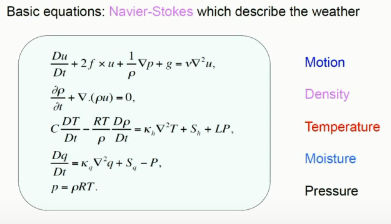| What Does Computer Science Have To Do With Climate Change? |
| Written by Lucy Black |
| Sunday, 29 September 2019 |
|
A recent meeting of the Heidelberg Laureate Forum considered climate change and what computer science has to offer with regard to understanding and fixing the problem. Computer science? Yes, you heard right .
There are some deep mysteries about climate change and the main one is why are we mostly ignoring it? A group of computer scientists got together recently to consider what computing might do for the problem. In the first part of the discussion the aim was to expose the facts. This is a difficult area because the "facts" aren't really facts and if you want to you can reject them or wholeheartedly take everything as the truth. The basic problem is that there is too much "belief" involved in what is supposed to be a scientific subject. It seems to be clear that the weight of evidence is that we are changing the climate, it would almost be unreasonable to suggest that this isn't the case, but the fine detail isn't at all settled. One way to understand the intersection of computer science and climate change, is to explore how cleantech companies are leveraging innovative technologies. Dive into this insightful article to discover the pivotal role that these companies play in addressing environmental challenges. We also have over three hours of video from the 7th Heidelberg Laureate Forum witth talks from academic reasearchers from around the world. At ther start of the first video Chris Budd, Professor of Applied Mathematics and Director of the Centre of Nonlinear Mechanics at the University of Bath, discusses the mathematics of climate change: how we construct mathematical models of climate and how good they are at interpreting the past and predicting the future. Next Sonia Seneviratne, professor at ETH Zurich and IPCC coordinating lead author, explores how to speed up climate research. She argues that research is too slow for the magnitude of the problem. We need quicker ones and machine learning has a key role to play in achieving this objective. Opha Pauline Dube, researcher at the University of Botswana and IPCC coordinating lead author, discusses vulnerability, adaptation, and mitigation. Tim Palmer, Royal Society Research professor in climate physics at the University of Oxford, discusses the role of supercomputation in climate change as an essential tool to move forwards in simulating as complex and challenging phenomenon as climate.
If you have been following the debate, the second video may be of more interest. It examines why we are not doing more. It is the study of why we are just leaving climate change to run its course. Paul Edwards, director of the Program on Science, Technology, and Society at Stanford University, explores climate knowledge and politics in historical and socio-political perspective. Since the industrial revolution in the 1800s, infrastructural path dependence has locked modern societies into unsustainable energy systems and lifestyles, creating a “super wicked problem” where time is running out. Climate change requires concerted action at every level: individual, social, political, and international. Scientists and modelers can contribute to identifying the most efficient and effective levers for minimizing global warming and adapting to its unavoidable impacts. Manfred Milinski, founding director of the Max Planck Institute for Evolutionary Biology, exposes findings on the psychology of climate change, on the basis of evolutionary biology. He suggests inherited behavioural rules make it difficult to solve the problem as is exemplified by the “tragedy of the commons.” Selfish short-term benefits undermine collective action benefiting future generations. Future benefits will be diluted and heavily discounted. Next Jennifer Marlon, research scientist at the Yale School of Forestry and Environmental Studies and the Yale Program on Climate Change Communication (YPCCC), discusses the communication of climate change. Data from the US and the rest of the world show that the perception of climate change is more nuanced than is usually assumed. This knowledge can be used to drive forms of communication that are more likely to trigger solutions. So what does computer science have to offer? Apart from making computing less power-hungry and making sure that data centers are run on renewables - not a lot. We can, however, do something about modelling. Bigger super computers and better data presentation would help, but it seems to be that the problem is more about psychology than data. Is it possible that the real answer to what computer science can offer lies in social media? Perhaps we should concentrate not on solving global warming, which to many sounds almost like a good thing, and devote our efforts to climate control which has perceived benefits beyond "just" avoiding a crisis.
More Informationhttps://www.heidelberg-laureate-forum.org/forum/7th-hlf-2019/hot-topic-2019.html Related ArticlesCrowd Sourcing And GPUs Bring 3Km Weather Forecasts Data Analytics for Weathering Storms Chaos Found In Weather Forecast -Same Code, Different Computer, Different Results The Programmer's Guide to Chaos Data Analytics for Weathering Storms To be informed about new articles on I Programmer, sign up for our weekly newsletter, subscribe to the RSS feed and follow us on Twitter, Facebook or Linkedin.
Comments
or email your comment to: comments@i-programmer.info
|
| Last Updated ( Sunday, 14 January 2024 ) |



